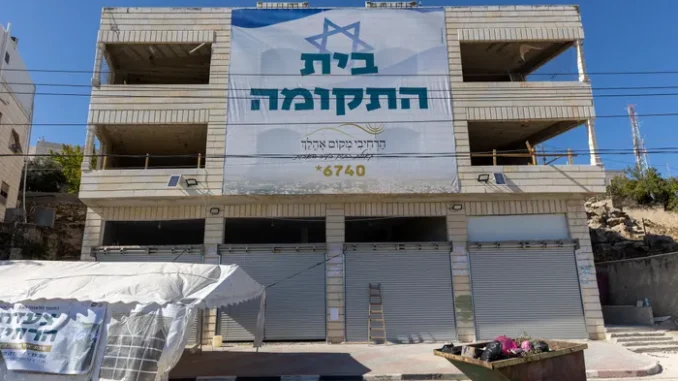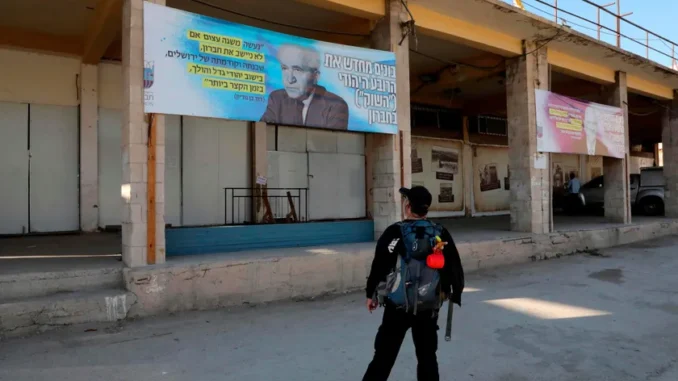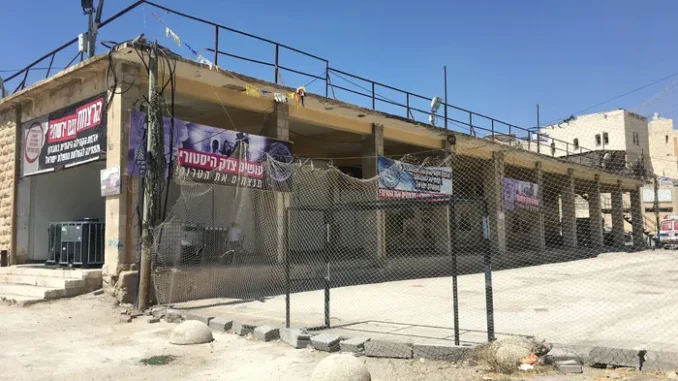Coalition agreement between Likud and Religious Zionism states it will advance the return of thousands of dunams of West Bank land as well as scores of buildings in Hebron to their pre-1948 Jewish owners
Hebron’s Jewish quarter in 2019. Parties are like commanding generals issuing military legislation that allow asset transfers.Credit: HAZEM BADER / AFP
A clause in the coalition agreement between Likud and Religious Zionism says the government will instruct the head of the army’s Central Command to enable assets currently held by the Civil Administration to be transferred to their pre-1948 Jewish owners. This move is expected to facilitate settlement expansion and allow Israel to gain control over Palestinian-leased buildings.
According to estimates obtained by the NGOs Peace Now and Bimkom, this move could affect about 13,000 dunams (3,250 acres) of land in the West Bank and about 70 buildings in Hebron, said to be owned by Jews before 1948.
Most of the land is in Gush Etzion (Bethlehem area) and north of Jerusalem, but other plots are in the area of Nebi Samuel, Batir and Beit Furik. Several parcels of land are in Area B, which is defined as land under Palestinian civil control and Israeli military control according to the Oslo Accords.
When Jordan controlled the West Bank from 1948 to 1967, it nationalized all property formerly belonging to Jews. Today, those properties are under the control of the commissioner for government properties within the Civil Administration and designated as “enemy lands.” Since the 1990s, Israeli government policy has dictated that the properties’ legal status would have to be determined by a future peace agreement rather than be returned to Jewish owners.

KThe “Revival House” building in Hebron, in November.
Land designated as “enemy lands” cannot be included in land-use planning, according to a source close to the settlers. Over the last several years, the source said, Israeli settlers have been able to amend that status by pointing out a flaw in the Jordanian government’s land registration system.
In 2018, a report published by a team of legal scholars led by Judge Haya Zandberg found that the government had allocated lands for settlements in the past in some instances.
According to the source, one possible target of this move could be the building of the wholesale market in Hebron, where the government plan to erect 70 housing units for Jews has met a few problems. While the West Bank was under Jordanian rule, the site was leased to the Hebron municipality as a protected tenant. After Israel’s occupation of the West Bank in 1967, that status was maintained.
After the 1994 Cave of the Patriarchs massacre, in which Jewish extremist Baruch Goldstein killed 29 Palestinians worshipers, the area was declared a military zone, and vendors who rented space from the city were barred from entering. Since then, the order has been repeatedly renewed.
Hebron’s wholesale market complex in 2019. Sources among settlers said that the intention to move the costs may also be related to the plan by the state to build 70 apartments for Jews in the complex.Credit: Peace Now
In December 2019, then-Defense Minister Naftali Bennett announced the beginning of the planning process for the new Jewish neighborhood there. Accordingly, the Civil Administration demanded the municipality, which still holds protected-tenant rights, to give its permission to destroy the complex, to which the municipality refused.
Samar Shehadeh, an attorney representing the Hebron municipality, said that despite the city’s refusal, Israel has not asked the courts to revoke the protected-tenant status yet. He warned that a transfer of the ownership of buildings to Jewish owners could harm the Palestinian tenants’ rights.
“As an administrative authority, the commissioner cannot just do whatever he wants. He is subject to proper management rules, High Court review, and a reasonableness standard the government is trying to eliminate,” Shehadeh said.
If ownership is indeed transferred to the commissioner, no one will be interested in preserving the rights Palestinian tenants currently enjoy, he added.
Noam Arnon, spokesman for the Jewish settlement in Hebron, told Haaretz that many of the relevant buildings in Hebron are empty. As an example, he cited Beit Ezra, a building that the settlers had taken over in the past and later were ordered to leave.
A Jewish family filed an appeal in 2011 seeking to have their pre-1948 Hebron properties returned to them. The Supreme Court rejected the appeal, and ruled that they were not entitled to compensation.





This coalition agreement is what is known as “pursuing justice” by fairly enforcing individual property rights — one small step for individual property owners, one giant leap for Israeli democracy and Zionism!
Fantastic!